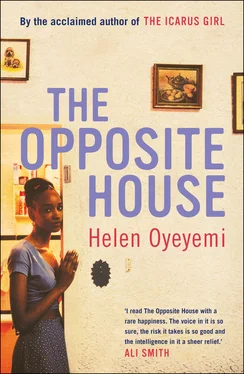Helen Oyeyemi - The Opposite House
Здесь есть возможность читать онлайн «Helen Oyeyemi - The Opposite House» весь текст электронной книги совершенно бесплатно (целиком полную версию без сокращений). В некоторых случаях можно слушать аудио, скачать через торрент в формате fb2 и присутствует краткое содержание. Год выпуска: 2008, Издательство: Bloomsbury UK, Жанр: Современная проза, на английском языке. Описание произведения, (предисловие) а так же отзывы посетителей доступны на портале библиотеки ЛибКат.
- Название:The Opposite House
- Автор:
- Издательство:Bloomsbury UK
- Жанр:
- Год:2008
- ISBN:нет данных
- Рейтинг книги:4 / 5. Голосов: 1
-
Избранное:Добавить в избранное
- Отзывы:
-
Ваша оценка:
- 80
- 1
- 2
- 3
- 4
- 5
The Opposite House: краткое содержание, описание и аннотация
Предлагаем к чтению аннотацию, описание, краткое содержание или предисловие (зависит от того, что написал сам автор книги «The Opposite House»). Если вы не нашли необходимую информацию о книге — напишите в комментариях, мы постараемся отыскать её.
The Opposite House — читать онлайн бесплатно полную книгу (весь текст) целиком
Ниже представлен текст книги, разбитый по страницам. Система сохранения места последней прочитанной страницы, позволяет с удобством читать онлайн бесплатно книгу «The Opposite House», без необходимости каждый раз заново искать на чём Вы остановились. Поставьте закладку, и сможете в любой момент перейти на страницу, на которой закончили чтение.
Интервал:
Закладка:
‘Listen to this,’ she says, pausing and looking at me. ‘This boy is absurd. His mother is wasting money paying me to help him pass. He will never pass; his head is a coconut. Here I see that he has sat down and thought to himself “I need to write another paragraph, but I am too stupid to use any more German.” So what does he do? He writes an entire paragraph in English and puts die, der and das where he feels it is appropriate. Sonntag abend, bin ich ins Kino gegangen , and then he puts a dash — not even a connective sentence — and a list of films: Austin Powers, Das Fifth Element, Face/Off, Der Full Monty —’
‘When are you going to make up with Papi?’ I ask.
Mami says, ‘When he puts my altar back.’
Her face is drawn.
‘Chabella,’ I say.
‘I can stand anything but that. There is so much of me that hasn’t survived with all this moving around. Paris. And Hamburg —’
I put a hand to Chabella’s cheek, and she puts her hand over mine.
‘Do you wish you’d stayed there? You can speak the language. .’
‘No, of course not. Germans are racist.’
I laugh. ‘All of them?’
She doesn’t smile. ‘All of them,’ she says, firmly. ‘Every single one.’
‘What about Brigitte?’ I ask.
Mami says, ‘Brigitte doesn’t count as German. Brigitte was trying to get away.’
I ask her why Papi moved her altar, and she raises her hands defensively, as if I’m going to hit her.
‘I asked my babalawo for something for your father’s pain — you know it kills him to walk around with his ankles like wood, but he will never say anything. I knew that he’d refuse the remedy because it’s herbal and because it’s “religious”, and he wanted me to make him coffee, so —’
‘Mami!. .’
‘Maja, I know. I know! And then I think I put in too much, because he vomited. My God, yes, he vomited, violently, so violently, and kept on stopping and starting like that for something like half an hour; I was praying. I thought maybe he’d vomit out the arthritis or something, either that or die. But then he stopped and he was fine. But straightaway he was shouting at me, calling me stupid woman, what had I done, because he said he knew I had done something, and he was saying all kinds of things to me — “You think you’re powerful,” he said, and then he said that I think I am a witch —’
‘Chabella, it’s OK, I know. It’s Papi. You know he’ll calm down.’
She knows.
‘But when will I calm down?’ Chabella asks. She flounces into mine and Aaron’s bedroom and slams the door. Beneath his covers in the sitting room, Aaron convulses at the sound and asks ‘Whaaaa?’ then subsides.
I tidy up Mami’s papers and wait.
I do not wait long. Dressed in her pyjamas now, Chabella opens the door a little way and murmurs, ‘Sing for me please?’
I start to hum, and to speak tunefully to myself, the way I do when I’m climbing into song. I am nervous because it’s been a few days and the most terrifying thing for someone whose vocal cords are strung for both song and speech would be to reach into the dark between one and the other for melody and find nothing. I find it.
It’s the five-year-old Maja that brings jazz into me, blocking my chest so that I have to sing it out. I turn my Cuba over in my mind: a myriad of saltwater noons whirring around the inside of Vedado; a drinking glass stained camel-colour. I remember paper plates fuzzed with fruit-cake crumbs, livid seizures of multicoloured ribbon and being swung, squealing and dizzy, from arm to arm along a line of much older boys at someone’s quinceanera . I struggled away when people cried on me as we were leaving from Jose Marti.
At the height of the Cuban summer, the heat came down from the sky differently from anywhere else I’ve been, came down with a passion for me, for every pore of my uncovered skin. I carefully extract my only complete memory that is longer than my life somehow
(God gave a loaf to every bird
But just a crumb to me
I dare not eat it — though I starve. .)
I remember a tiny, veiled woman appeared beneath the palm trees at the bottom of the garden of a house in Vedado. Our going-away party. It was full moon, white paper moon; the glass lanterns on the tables cast shadowed orange crescents onto the grass. I peered out from beneath the high table, an earthy hinterland where I and another girl with a soft, ruddy face were sitting and eating papaya in the centre of a polished starfish of adult feet. There was a stir as someone else noticed that woman at the end of the garden, the woman who was not one of us. People began asking who she was. And then she began to sing to us out of the falling night. We couldn’t understand her words — she mixed Spanish with another language that no one there knew — but the first notes felled me the way lightning brings down trees without explanation or permission.
The girl who was under the table with me began to suffer a fit — her eyes whirled blind, she slurped and dribbled and winced as she bit her tongue over and over. One of her hands drummed at the side of her head as if trying desperately to dislodge something. I noticed her only distantly. To avoid her slapping me by accident, I moved away, closer to the warm grass outside and the song. I didn’t think to tell anyone about the other girl’s fit. It was only when the woman had finished singing and slipped away under cover of the grown-ups’ applause that the girl’s mother discovered her under the table and carried her away.
My Cuba is a hut with a tabletop for a roof, wall-less and unmoored by strange music and feet and fruit juice. So of course my singing is nothing like Billie’s speech from amidst the pieces of her heart, and it doesn’t imitate Ella’s pure tone; my noise doesn’t sound anywhere near as good as they do because I am not really singing. No one knows that but me. Peace. When I rework my Cuba I allow myself to notice that, just to the right of me, Papi’s tuxedoed knees are shaking. I understand what I didn’t understand then, that he didn’t see a path beyond leaving forever, that the country had been ripped up from under him and handed to an ‘everyone’ far above. And that it was scary; scary to freefall the way that he knew he was about to, with all chains cut, no land behind him and no solid ground before him.
‘Mami, I was thinking of becoming a postulant, you know,’ I say, after a silence. But I say it in a joking way, as if Chabella is supposed to laugh. She does.
‘Well, if Aaron isn’t making you happy, there are other men, you know. . you don’t have to become a nun. . anyway, what’s wrong with Aaron?’
She yawns, and goes to bed.
If I’d begun in the right way I might have been able to tell her why I ran away to St Catherine’s. But I think about the two tiny, jewel-eyed girls who used to walk with me in my sleep, and I feel nauseated. It’s like telling Mami about my son will bring bad luck. If I say anything it’ll bring back the potions and the night vigils.
Miss Lassiter’s telephone is ringing — she has it on a loud setting so that it soaks through the separating floors like a tremulous wave.
3 unto the little
Aaron holds tube and lift doors open for people if he’s nearest, crumpling his newspaper against the hard edges as if he can stop gravity with paper. While waiting at bus stops he pulls faces at children in front of their parents. His smile has corners and a slant that no one else’s has. With no way of knowing whether I can trust him, I go on what I have to go on in the dark — when he touches me, there’s no describing the snow-blister craziness, seething quiet but large, waiting. When he whispers in my ear, I buckle under him. When we are walking, he reaches for me carelessly, holds me carefully, dips his hand into my pocket and holds it there so that I end up pulling him along. Or, his fingers hover over the nape of my neck, absent-mindedly tapping me to the pattern of my pulse, rubbing circles that make me dizzy. The whole time he talks, describes things as if we are on a clock face
Читать дальшеИнтервал:
Закладка:
Похожие книги на «The Opposite House»
Представляем Вашему вниманию похожие книги на «The Opposite House» списком для выбора. Мы отобрали схожую по названию и смыслу литературу в надежде предоставить читателям больше вариантов отыскать новые, интересные, ещё непрочитанные произведения.
Обсуждение, отзывы о книге «The Opposite House» и просто собственные мнения читателей. Оставьте ваши комментарии, напишите, что Вы думаете о произведении, его смысле или главных героях. Укажите что конкретно понравилось, а что нет, и почему Вы так считаете.












